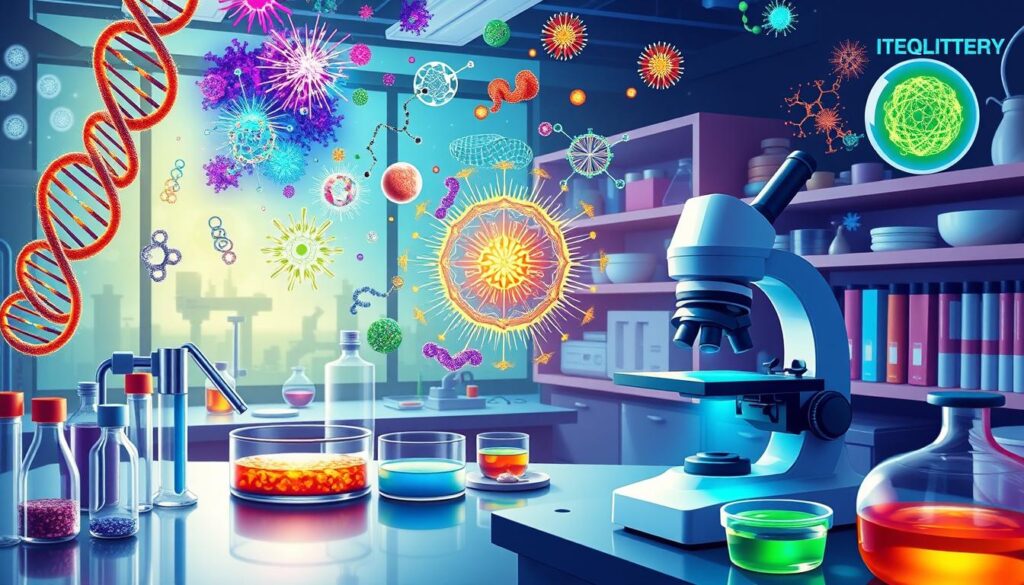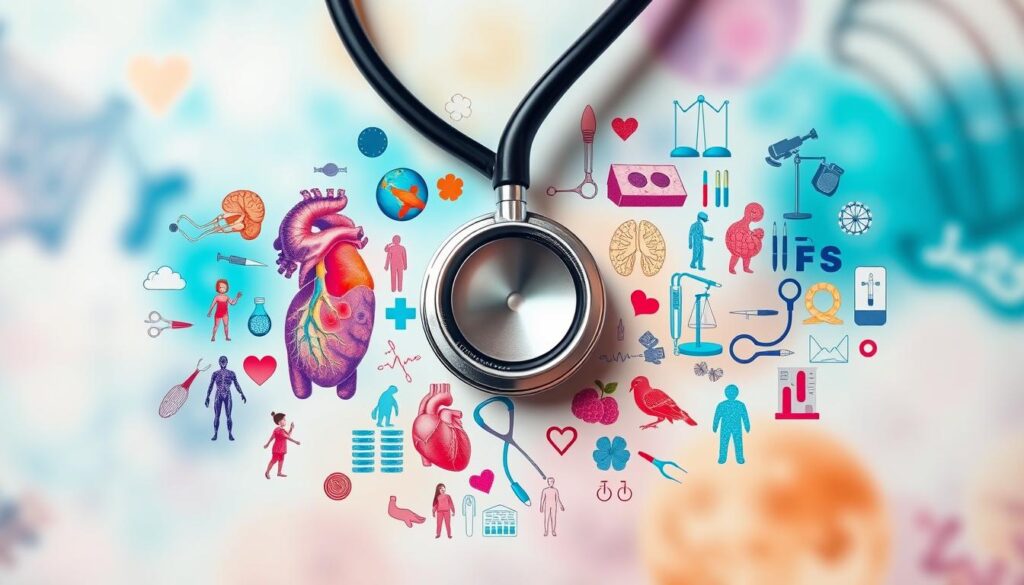Medical College is a wide-ranging program. It prepares students for a career in healthcare. Students learn a lot, from basic sciences to clinical training.
At the heart of medical school are basic science courses. These include biology, chemistry, physics, and math. They give medical students a solid base in health and disease.
But there’s more. The curriculum also covers clinical sciences. This includes anatomy, physiology, pathology, and pharmacology. It gets students ready for real patient care.
Key Takeaways
- Medical college curriculum covers a broad range of subjects, including core sciences, clinical sciences, and specialized medical disciplines.
- Prerequisite courses in biology, chemistry, physics, and mathematics provide a strong scientific foundation for aspiring doctors.
- Clinical sciences, such as anatomy, physiology, pathology, and pharmacology, prepare students for hands-on patient care.
- Medical schools offer a mix of classroom instruction, laboratory work, and clinical rotations to ensure a comprehensive education.
- The curriculum is designed to equip students with the knowledge and skills necessary for a successful career in the healthcare field.
Core Science Requirements for Medical Education
To get into the medical college of wisconsin, students need a solid base in key sciences. These courses are not just about learning facts. They also help students think critically and solve problems, skills vital for medical school.
Biology and Laboratory Requirements
Students must take a full year of biology. This includes studying cells and molecules, with a lab part. The lab work lets students practice what they learn and get hands-on experience.
Chemistry and Biochemistry Fundamentals
For the medical college of wisconsin and central wisconsin health research, a two-year chemistry course is needed. This includes inorganic, organic, and biochemistry. Each chemistry class must have a lab to help students understand chemical concepts better.
Physics and Mathematics Prerequisites
Students need one year of physics, with a lab, to get ready for medical school. They should also take one year of math, covering calculus and statistics. This helps build strong skills in numbers and data.
These science basics show a student’s readiness for biomedical sciences and the m.d program at the medical college of wisconsin. By excelling in these subjects, students prepare for a career in academic medicine.
| Subject | Requirement |
|---|---|
| Biology | 1 year with lab |
| Chemistry | 2 years, including inorganic, organic, and biochemistry with lab |
| Physics | 1 year with lab |
| Mathematics | 1 year, including calculus and statistics |
Medical College Basic Clinical Sciences

At medical colleges, students learn the core clinical sciences. These include anatomy, physiology, pathology, pharmacology, immunology, and microbiology. These subjects help students understand the human body, diseases, and treatments.
Anatomy teaches about the body’s structures and systems. This includes bones, muscles, and nerves. Physiology explains how these parts work together, keeping the body balanced and reacting to changes.
Pathology helps students learn about diseases. They study how diseases start, grow, and show symptoms. Pharmacology teaches how medicines work in the body. This knowledge helps students choose the right treatments.
Immunity classes focus on the body’s defense against sickness. Microbiology explores the world of germs and how they cause diseases. This knowledge is key for fighting infections.
By combining these sciences, medical colleges prepare students. They learn to think critically and care for patients well.
“The basic sciences are the foundation upon which the entire edifice of medicine is built.”
– William Osler, renowned physician and medical educator
Advanced Biomedical Sciences and Research Methodology

Medical students dive into advanced biomedical sciences. They learn about life’s basics at the cellular and molecular levels. Subjects like molecular biology, genetics, cell biology, and physiology help them understand the human body better.
Molecular Biology and Genetics
Courses in molecular biology and genetics cover nucleic acids and genes. They teach about heredity, disease, and genetic analysis techniques. Students also learn about the central dogma, gene expression, and translational research and biomedical research advancements.
Cell Biology and Physiology
Cell biology and physiology courses focus on life’s building blocks. They delve into cells, tissues, and organ systems. Students study cellular metabolism, signaling, and how health disparities affect physiology.
Research Methods and Statistics
Medical students learn research methods and statistics. These courses prepare them for research careers or evidence-based practice. They cover study design, data analysis, and scientific literature interpretation. Biostatistics teaches statistical techniques for biomedical data analysis.
“The advanced biomedical sciences courses provide a solid foundation for understanding the fundamental mechanisms of life, which is essential for delivering effective healthcare and advancing translational research.”
Specialized Medical Disciplines and Systems

Medical college curricula cover many specialized fields. These include internal medicine, pediatrics, surgery, obstetrics and gynecology, psychiatry, neurology, and oncology. These courses give students deep knowledge and skills in specific areas. This prepares them for their future careers and specializations.
The curriculum mixes basic science with practical clinical skills. This helps students understand human health and diseases well. They learn about organ systems, how to diagnose, and treatments for each specialty.
For example, an allergist-immunologist needs three years of internal medicine or pediatrics. Then, they spend two years in allergy and immunology. This makes a total of five years of training after college.
Anesthesiologists have a four-year residency. Cardiologists start with three years in internal medicine, then three more in cardiology.
These fields have many subspecialties. Dermatology has subspecialties like dermatopathology and pediatric dermatology. Emergency medicine has subspecialties in pediatric emergency and sports medicine.
By learning these specialized areas, students become better at caring for patients. They can handle the unique needs of different people. They also help move healthcare forward.
| Medical Specialty | Typical Residency Duration |
|---|---|
| Internal Medicine | 3 years |
| Pediatrics | 3 years |
| Surgery | 5 years |
| Obstetrics and Gynecology | 4 years |
| Psychiatry | 4 years |
| Neurology | 4 years |
| Oncology | 3-4 years |
“The medical field is a never-ending journey of discovery, where specialized disciplines constantly evolve to meet the diverse needs of our patients.”
Clinical Training and Patient Care Studies
Clinical training and patient care studies are key parts of medical education. They help students learn the skills needed to care for patients well. Students get hands-on experience, learning how to examine patients, diagnose problems, and communicate effectively.
Also Read : What Vaccines Are Recommended For Preventive Care?
Physical Examination Skills
Learning to perform physical exams is crucial for doctors. Students get trained to assess patients thoroughly and understand their findings. They practice these skills in labs, like the Ann Crowe Essig Patient Simulation Learning Laboratory, with the help of standardized patients.
Clinical Rotations Overview
Clinical rotations let students apply what they’ve learned in real healthcare settings. They take place in hospitals, clinics, and other places. This experience prepares them for medical residencies and future careers, teaching them how to solve problems and care for patients.
Patient Communication Techniques
Good communication is essential in patient care. Students learn to have tough conversations, understand patients, and explain medical info clearly. They practice these skills through role-playing and working with standardized patients, helping them build trust and positive relationships with patients.
FAQs
Q: What subjects are typically studied in medical school?
A: Medical school generally covers subjects such as anatomy, physiology, biochemistry, pharmacology, pathology, microbiology, and public health, alongside clinical experience and training programs to prepare students for practice medicine.
Q: How does the curriculum at the Central Wisconsin campus differ from other medical schools?
A: The Central Wisconsin campus of MCW focuses on providing a community-oriented education, emphasizing primary care and the unique health needs of the region while maintaining the rigorous standards of medical training.
Q: Can students pursue a dual degree at MCW?
A: Yes, MCW offers dual degree programs, allowing students to earn their MD alongside a Master of Science, such as a Master of Science in Anesthesia, which enhances their qualifications and prepares them for specialized fields in medicine.
Q: What is the importance of accreditation for medical schools?
A: Accreditation is crucial because it ensures that the medical school meets certain educational standards, which is necessary for the institution to grant recognized degrees and for graduates to be eligible for postgraduate training programs in the U.S.
Q: Are there opportunities for clinical experience during medical education at MCW?
A: Absolutely! MCW emphasizes hands-on clinical experience throughout the curriculum, allowing students to engage in real-world medical settings and develop their compassionate care skills as they train to become the next generation of physicians.
Q: What types of upcoming events does MCW host for prospective medical students?
A: MCW regularly hosts various upcoming events such as open houses, information sessions, and webinars where prospective students can learn more about the medical school, admissions process, and student life at the Milwaukee and Central Wisconsin campuses.
Q: How does MCW prepare students for the challenges in the field of health science?
A: MCW prepares students by fostering critical thinking, providing access to cutting-edge research, and engaging them in community service, which helps develop the skills necessary to serve others effectively in their future medical careers.
Q: What resources are available for student affairs at MCW?
A: MCW’s Office of Student Affairs provides various resources such as academic advising, counseling services, and support for student organizations, ensuring that students have the necessary tools to succeed in their medical training.
Q: How can I contact MCW for more information about their medical programs?
A: For more information about MCW’s medical programs, you can contact us directly through the college’s website, where you can find detailed contacts for admissions and academic inquiries.
Source Links
- https://www.princetonreview.com/med-school-advice/what-to-expect-in-medical-school
- https://www.sgu.edu/blog/medical/medical-school-curriculum-by-year/
- https://mededits.com/medical-school-admissions/medical-school-requirements/